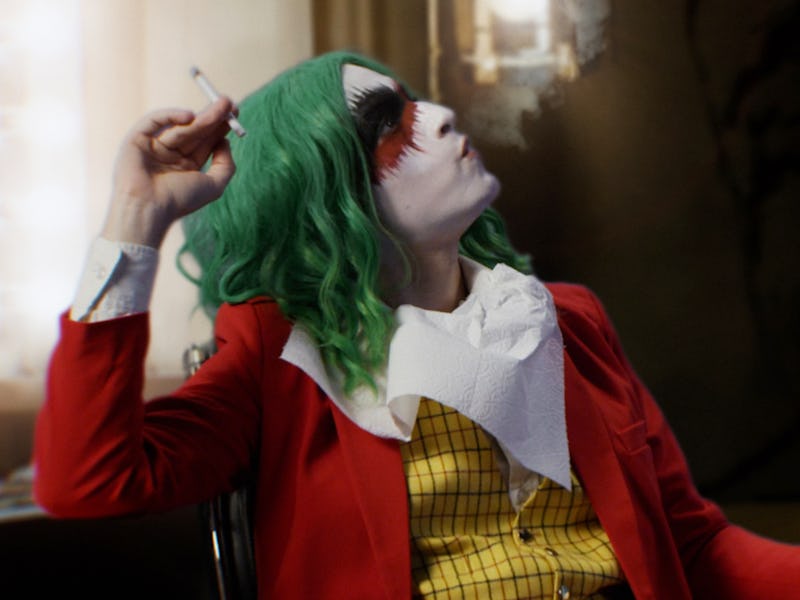The People’s Joker Made Me Realize I Wasn’t My Own Supervillain
It took a Joker to reveal the villain in my story.

As long as there have been superhero movies, there have been superhero parody movies. They range from the gritty and dark to goofy and raunchy, but they all pretty much have the same message: what happens in superhero movies isn’t what would happen in reality. But in 2024, in an era completely dominated by the Marvel Cinematic Universe, one superhero parody movie managed to create something completely brand new: a story that wasn’t just a commentary on the superhero movie machine, but an exploration of what it means to see yourself in a way that nobody else seems to agree with.
Now streaming on Mubi, this movie did more than just change my opinion on one of the most notorious superhero villains — it made me change my opinion on my own past, altering my life forever.
The People’s Joker, written and directed by Vera Drew, isn’t an easy movie to watch. Drew got her start as an editor for frenetic alt-comedy series like On Cinema and I Think You Should Leave, and would make video collages on the side. A Venmo payment of $12 from a friend as a joke suggested a new project: a re-edit of Todd Phillips’ Joker.
But as Drew attempted to morph Joker in her image, she realized the project was really something else entirely: a semi-autobiographical film telling her origin story as a trans woman in the comedy scene, through the lens of the Clown Prince of Crime. The result is The People’s Joker, a green-screen heavy, multi-media fever dream depicting her coming-of-age story, from transitioning from “joker to harlequin” and the complicated relationship with her mother.
The People’s Joker’s visuals are heady video-art-collages with a heartfelt story underneath.
I was so excited to watch The People’s Joker for the first time. Unlike seemingly everyone else in the world, I couldn’t stand Todd Phillips’ Joker, finding it an inferior Taxi Driver tribute to my favorite horror movie of all time, 1982’s The Last Horror Film. I wanted to see Drew’s experimental take on the same story, especially after I heard it was pulled from Toronto International Film Festival after a worrying letter from Warner Bros. What could be in this multicolored queer memoir movie to warrant that?
But what was most intriguing to me wasn’t Joker the Harlequin’s story of starting classes at UCB (the United Clown Bureau) or coming out as a trans woman — I had settled into my identity as a stereotypical they/she years ago. What really grabbed me was Harlequin’s love story. She meets Mr. J (Kane Distler), a transmasc “edgy” comedian who helps her come out and transition. (But it’s still a superhero movie, so she transitions by dunking herself in a vat of chemicals).
But slowly, the relationship between Joker and Mr. J turns into something far more sinister. “When they show abusive relationships in movies, they're always the beer-bellied wife-beater, it's never a 90-pound trans dude,” Joker says to the camera, “And if it's not like that in the movies, how's a girl like me supposed to know to look for the signs?”
The relationship between Joker and Mr. J shows a different side of abuse.
I had recently ended a relationship, and was dealing with my own shame around it — I took it as a personal failing, something I was supposed to maintain and subsist but couldn’t, despite my best efforts. Then, Joker started talking to the camera, and it felt like she was talking to me. “Here's Joker the Harlequin's patented list of warning signs to look for in a potential narcissistic emotional abuser,” she says. “Number one, he negs you. Number two, he makes it clear that his trauma is more important than yours. And number three. I mean, if he's a comedian, just run for the hills. Guilty till proven innocent. Don't date comedians, please, ever.”
Thankfully, my ex wasn’t a comedian, so we were in the clear there. But the other two, and the examples shown with Mr. J, hit way too close to home. I was so convinced that my relationship’s failure was my fault, I didn’t see those signs, even in retrospect. Watching Mr. J hold a physical “gaslight” up to Joker, making her repeat phrases like “I'm selfish for complaining about my unbroken home” felt like I was finally seeing through all that manipulation.
It’s a surprisingly common reaction to the movie. When I interviewed Vera Drew earlier this year, she described many people having visceral reacions to the abusive relationship scenes. “It really has an effect on people in that way, specifically if they've been in any semblance of a relationship like the one we show in the movie,” she said. “The stuff in there is some of the most personal and traumatic things that I ever went through, and I think it also made me feel very isolated for many years. So the fact that it resonates with people and can bring them catharsis... I couldn't have ever asked for anything more from a movie that also has so many dick jokes and a character named Suicide Cop.”
You don’t have to be a bad person to be the villain in somebody’s story, but you also don’t have to be the only villain in your story. It’s not selfish to realize that someone loving you doesn’t keep them from hurting you, even unintentionally. We live in a society; a society of people who try their best to live and love and heal. I definitely should not have cried so much at a movie featuring a crudely CGI-ed nude Lorne Michaels, but sometimes the most profound truths are found in the strangest places.